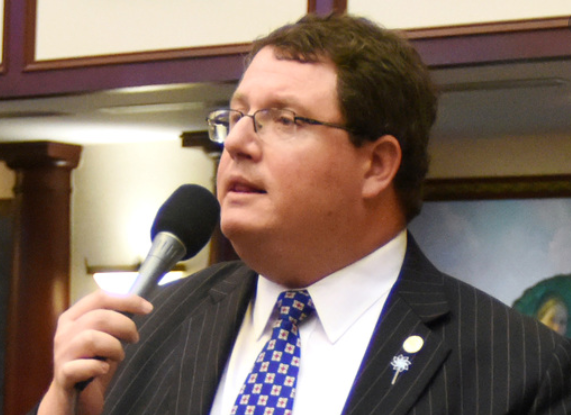
Ryan Dailey, News Service Florida
A House bill that would expand eligibility for school vouchers advanced Wednesday but has marked differences from a voucher proposal being considered by the Senate.
The Republican-controlled House Education & Employment Committee approved the bill (PCB EEC 21-01) on an 18-3 vote, with Democrats casting the dissenting votes.
The measure would end what are known as the Gardiner and McKay scholarship programs, which serve students with special needs. Those programs would be absorbed into the state’s Family Empowerment Scholarship program, which currently serves a broader population of low- to middle-income families.
Rep. Randy Fine, a Brevard County Republican who is carrying the bill, said it “removes complexity without consequence” for parents looking to enroll children in voucher programs.
“We have multiple school choice programs that all do the same thing and create confusion; McKay, Gardiner, Family Empowerment. This will shrink down those numbers of choices while having the same scholarships, but with fewer entry points,” Fine said during Wednesday’s committee meeting.
The measure also would eliminate a requirement that parents annually renew participation in the programs.
“It will also make it simpler to be in these programs because it will not require parents to jump through hoops every year to get renewals,” Fine said.
The amount of money provided through school vouchers also would increase under the House measure. Currently, students who receive Family Empowerment scholarships, Florida Tax Credit scholarships or Hope scholarships receive funding that is 95 percent of what they would have generated in the public-school funding formula. The bill would increase the voucher amounts to 100 percent of the funding formula level.
But the House plan is significantly different from a voucher bill (SB 48) that has been moving through the Senate.
The Senate proposal would consolidate the state’s five major voucher programs into two. One would combine current scholarships serving special needs students to create the McKay-Gardiner Scholarship program.
The broader population of students would be served by the Family Empowerment Scholarship program, which would absorb the Tax Credit Scholarship and Hope Scholarship programs. The Tax Credit Scholarship program provides tax credits to businesses that help fund vouchers, while the Hope Scholarship program offers vouchers to students who have been bullied.
All voucher programs would be established as what are known as education savings accounts under the Senate plan. The accounts would give parents flexibility in spending, with the amounts at 97.5 percent of the public-school formula level.
Parents could use money to purchase things like electronic devices, educational materials and tutoring. McKay-Gardiner recipients would have additional flexibility for expenses like specialized therapies.
The House measure would allow similar flexible spending only for special needs students.
“Ours is more voucher-driven,” Fine said of the House proposal. “If it’s a voucher, it’s easier to monitor what spending is going on, you take it, you give it to a school and off you go to the school.”
Fine said education savings accounts would be available to students with special needs.
“We’re not eliminating ESAs. One of the programs will still have them, but our view is, we’re just a little bit more focused on vouchers,” Fine said.
The House measure also would expand eligibility for voucher programs by removing a current requirement that students must previously have attended public schools. That proposed change is also in the Senate bill.
In addition, the House proposal would exempt students from military families or children in foster care from a cap on the number of Family Empowerment Scholarship recipients.
The conservative group Americans For Prosperity has backed the Senate measure but also supports the House proposal.
“We think that it moves the ball forward and continues the conversation. We believe that it gives the ability for kids to have more options. More students will be eligible,” Skylar Zander, the group’s state director, told The News Service of Florida on Wednesday.
Zander’s group has supported the part of the Senate bill that would convert voucher programs to education savings accounts.
“We think that ESAs are much more flexible and allow people to do more things with them overall,” Zander said.
The Florida Education Association teachers union opposes both bills. Among its concerns is part of the House bill that would change funding for what are now the Gardiner scholarships. Those scholarships currently receive legislative appropriations, but the bill would lead to them being funded through the Florida Education Finance Program, the longstanding system for funding public schools.
“There’s so much uncertainty with next year’s student enrollment for existing students, this may not be the time to make a large structural change in our funding mechanism for public school students,” Florida Education Association lobbyist Cathy Boehme said.
A House staff analysis of the measure said it would have an indeterminate fiscal impact to the state.
“The reason the fiscal is indeterminate is because we don’t know how many parents will take advantage,” Fine said.
Negotiations between the House and Senate on the voucher bills are underway, Fine said.
“There are ongoing discussions. I think both sides want the same thing, more choices for more parents. But sometimes how you get there is (done) a little bit differently,” Fine told reporters.
Fine said he expects his proposal to go to one more committee before heading to the House floor. The Senate bill is ready for consideration by the full chamber.


